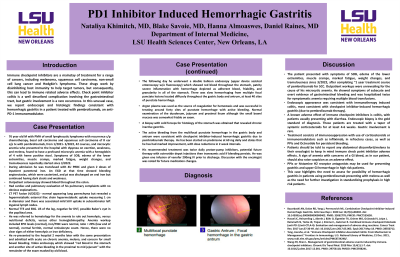Tuesday Poster Session
Category: GI Bleeding
P3497 - PD1 Inhibitor Induced Hemorrhagic Gastritis
Tuesday, October 24, 2023
10:30 AM - 4:00 PM PT
Location: Exhibit Hall

- NK
Nataliya Khimitch, MD
LSU Health Sciences Center
New Orleans, LA
Presenting Author(s)
Award: Presidential Poster Award
Nataliya Khimitch, MD, Blake Savoie, MD, Hanna Almoaswes, , Daniel Raines, MD
LSU Health Sciences Center, New Orleans, LA
Introduction: Immune checkpoint inhibitors are a mainstay of treatment for many cancers, including melanoma, SCC, non-small cell lung cancer and Hodgkin’s lymphoma. These drugs work by disinhibiting host immunity to help target tumors, but consequently, this can lead to immune related adverse effects. Check point inhibitor colitis is a well described complication involving the gastrointestinal tract, but gastric involvement is a rare occurrence. In this unusual case, we report endoscopic and histologic findings consistent with hemorrhagic gastritis in a patient treated with pembrolizumab, an anti-PD-1 immunomodulator.
Case Description/Methods: 76 year old M with SLL s/p chemo, BCC and SCC s/p tx with pembrolizumab, presented to the hospital with DOE, weakness, and melena, found to have microcytic anemia. Symptoms of SOB, edema of the lower extremities, muscle cramps, fatigue, and tremulousness. During admission he was transfused with pRBCs and IV iron. An EGD showed bleeding angioectasias. Colonoscopy with blood throughout the colon. He was admitted 2 months later with the same presentation. Video endoscopy showed red blood in the stomach and active bleeding in the jejunum. A double balloon enteroscopy was done. APC was used for hemostasis and treated around 40 sites of punctate hemorrhage with active bleeding, consistent with checkpoint inhibitor-induced hemorrhagic gastritis. He was started on prednisone 60mg daily with improvement in symptoms, and dose reductions in 2 week intervals.
Discussion: The patient presented with symptoms for 3 months, after 14 months of keytruda for SCC. Outpatient workups were unrevealing for the cause of anemia. Upper EGD showed hemorrhaging from multiple focal punctate lesions diffusely throughout the gastric body and antrum. Biopsies revealed chronic inactive gastritis. Endoscopic appearance consistent with immunotherapy induced colitis, specifically checkpoint inhibitor-induced hemorrhagic gastritis. Treatment consists of immunosuppression with steroids or immunomodulators, infliximab if refractory, and PPIs/Octreotide for persistent bleeding. Patients should be told to report any abdominal symptoms to the oncologist to keep in mind immune check point inhibitor adverse effects. PPIs or H2 antagonists may be used for preventing gastritis and upper GI hemorrhage. This case highlights the need to assess for possibility of hemorrhagic gastritis in patients using pembrolizumab as well as the need for further investigation in standardizing prophylaxis in high risk patients.

Disclosures:
Nataliya Khimitch, MD, Blake Savoie, MD, Hanna Almoaswes, , Daniel Raines, MD. P3497 - PD1 Inhibitor Induced Hemorrhagic Gastritis, ACG 2023 Annual Scientific Meeting Abstracts. Vancouver, BC, Canada: American College of Gastroenterology.
Nataliya Khimitch, MD, Blake Savoie, MD, Hanna Almoaswes, , Daniel Raines, MD
LSU Health Sciences Center, New Orleans, LA
Introduction: Immune checkpoint inhibitors are a mainstay of treatment for many cancers, including melanoma, SCC, non-small cell lung cancer and Hodgkin’s lymphoma. These drugs work by disinhibiting host immunity to help target tumors, but consequently, this can lead to immune related adverse effects. Check point inhibitor colitis is a well described complication involving the gastrointestinal tract, but gastric involvement is a rare occurrence. In this unusual case, we report endoscopic and histologic findings consistent with hemorrhagic gastritis in a patient treated with pembrolizumab, an anti-PD-1 immunomodulator.
Case Description/Methods: 76 year old M with SLL s/p chemo, BCC and SCC s/p tx with pembrolizumab, presented to the hospital with DOE, weakness, and melena, found to have microcytic anemia. Symptoms of SOB, edema of the lower extremities, muscle cramps, fatigue, and tremulousness. During admission he was transfused with pRBCs and IV iron. An EGD showed bleeding angioectasias. Colonoscopy with blood throughout the colon. He was admitted 2 months later with the same presentation. Video endoscopy showed red blood in the stomach and active bleeding in the jejunum. A double balloon enteroscopy was done. APC was used for hemostasis and treated around 40 sites of punctate hemorrhage with active bleeding, consistent with checkpoint inhibitor-induced hemorrhagic gastritis. He was started on prednisone 60mg daily with improvement in symptoms, and dose reductions in 2 week intervals.
Discussion: The patient presented with symptoms for 3 months, after 14 months of keytruda for SCC. Outpatient workups were unrevealing for the cause of anemia. Upper EGD showed hemorrhaging from multiple focal punctate lesions diffusely throughout the gastric body and antrum. Biopsies revealed chronic inactive gastritis. Endoscopic appearance consistent with immunotherapy induced colitis, specifically checkpoint inhibitor-induced hemorrhagic gastritis. Treatment consists of immunosuppression with steroids or immunomodulators, infliximab if refractory, and PPIs/Octreotide for persistent bleeding. Patients should be told to report any abdominal symptoms to the oncologist to keep in mind immune check point inhibitor adverse effects. PPIs or H2 antagonists may be used for preventing gastritis and upper GI hemorrhage. This case highlights the need to assess for possibility of hemorrhagic gastritis in patients using pembrolizumab as well as the need for further investigation in standardizing prophylaxis in high risk patients.

Figure: Upper endoscopy showing multiple focal punctate lesions located diffusely throughout the gastric body and antrum, at least 40 sites of punctate hemorrhages.
Disclosures:
Nataliya Khimitch indicated no relevant financial relationships.
Blake Savoie indicated no relevant financial relationships.
Hanna Almoaswes indicated no relevant financial relationships.
Daniel Raines indicated no relevant financial relationships.
Nataliya Khimitch, MD, Blake Savoie, MD, Hanna Almoaswes, , Daniel Raines, MD. P3497 - PD1 Inhibitor Induced Hemorrhagic Gastritis, ACG 2023 Annual Scientific Meeting Abstracts. Vancouver, BC, Canada: American College of Gastroenterology.

